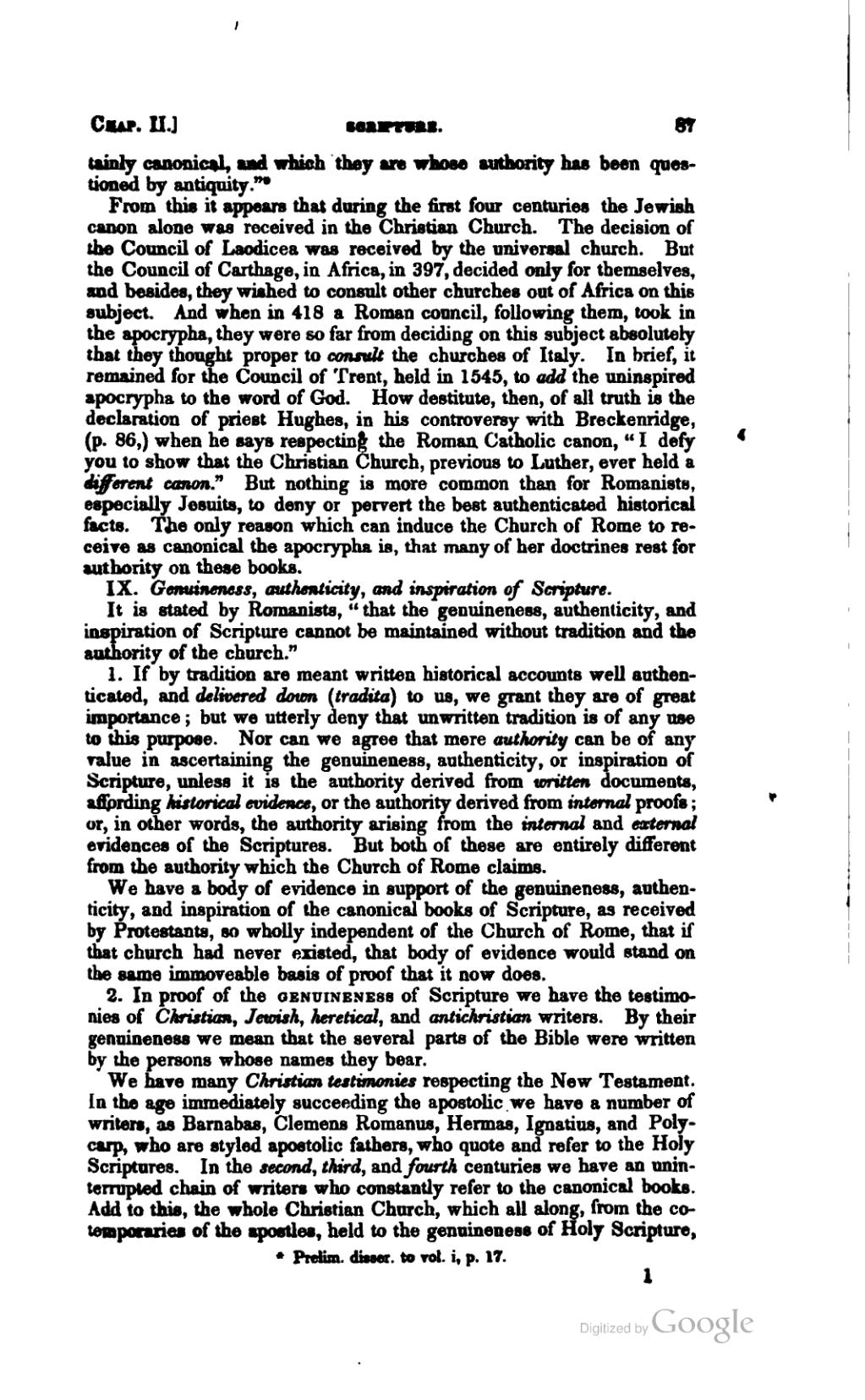0w?v. tl.l ?. 8V From tbi?_ it appeam that during the ilrst four centuries the Jewish canon alone was received in the Christian Church. The decision of tim Council of Laodicea was received by the universal church. But the Council of Carthage, in Africa, in 307, decided only for themselves, and besides, they whited to consult other churches out of Africa on this subject. And when in 418 a Roman council, following them, took in the apocrypha, they were so far from deciding on this subject absolutely that they thought proper to ,n__co?_?. the churches of Italy. In brief, it remained for the Council of I?rent, held in 1� to add the uninspired apocrypha to the word of Ood. How destitute, then, of all truth is the declaration of priest Hughes, in his controversy with Breckenridge, (p. S6,) when he says respectin? the Reinrex (?atholic canon, "! defy you to show that the Christian Church, previous to Luther, ever held a d/?'eat c?moa." But nothing is more common than for Eomanists, especially Jesuits, to deny or pervert the best authenticated historical facts. T?te only reason which can induce the Church of Rome to re- ceive as canonical the apocrypha is, that many of her doctrines rest for authority on these books. IX. Gom?ae?ess, ma?ff*?y, rout iv spb'a?on of Scripture. It is stated by Pmmanism, "t_h_a_t the genuineness, authenticity, and m?ira. tion of Scripture cannot be maintained without tradition and the authority of the church." 1. If by tradition are meant written historical accounts well authen- ticated, and d,,Z/t?-M doum (trad/?a) to us, we grant they are of great impertance; but we utterly deny that unwritten tradition is of any use to fixis purpese. Nor can we agree t_h_a_? mere au?Aor/t? can be of an), value in ascertaining the genuineness, authenticity, or inspiration of ?cripture, unless it is the authority derived from ? documents, affprding ]?s? ?.t,/dem?, or the authority derived from intowind proofs; or, in other words, the authority* arising from the h?ernaJ and ? evidences of the Scriptures. But both of these are entirely different from the authority which the Church of Rome claims. We have a body of evidence in support of the genuineness, authen- ticity, and inspiration of the canonical books of Scripture, as received by Protestants, 8o wholly independent of the Church of Rome, that if tlmt church had never existed, that body of evidence would stand on tim same iramoveable basis of proof that it now does. 2. In proof of the OSNUt?SSSSS of Scripture we have the testimo- nies of CAr/s?, ./eto/sA, AcreS, and ?/cAr?tm writers. By their genuineness we mean that the several parts of the Bible were written by the persons whose names they bear. We have many (?? ?e?mon/es respecting the New Testament. In the age immediately succeeding the apostolic .we have a number of write?, as Barnabas, C?lemens l?omanus, Hermas, Ignatius, and Poly- carp, who are styled apestoi/c faxhers, who quote and refer to the Holy Scriptures. In the seepS, tA/rd, andfourM centuries we have an unin- terrupted chain of writera who constantly refer to the canonical books. Add to this, the whole Christian Church, which all along, from the co- tsmpmmies of the spotales, held to the genuineness of Holy Scripture,
- Prellre. dimrot. to vol. i, p. I?.
�
